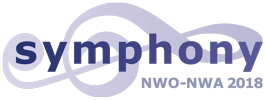SYMPHONY on tour: Interview with Dr. Renske ten Ham (NWO VENI laureate 2024)
Dr. Renske ten Ham is an Assistant Professor at the UMC Utrecht and specializes in health economics and health technology assessment (HTA) of regenerative medicines. She is one of the supervisors of Work package 8, which focuses on the costs and effects of treatments for inherited bleeding disorders. Recently, she was awarded a VENI grant from the Dutch Research Council (NWO), allowing her to further pursue methodological research in her field.
Background
Dr. ten Ham transitioned from pharmacy to health economics during her Master’s studies, where she developed an interest in the affordability and reimbursement of expensive drugs. After briefly working as a consultant, she returned to academia to pursue a PhD focused on regulation and health technology assessment of advanced therapies. However, the health economics and HTA related topics still excited her the most.
Grant-winning research
Dr. ten Ham is particularly drawn to the uncertainty in decision-making surrounding novel therapies. She highlights that many regenerative medicines including gene therapies come with significant uncertainty regarding their effectiveness and cost-effectiveness. Her VENI research will focus on developing methods to more better assess, particularly in relation to reimbursement decisions.
One of the key components of her work will involve using advanced Bayesian statistical methods. Traditional cost-effectiveness analysis mostly uses frequentist approaches -which are less flexible – and some basic Bayesian approaches. Bayesian methods allow for more adaptive analyses, for example by incorporating data from multiple sources—such as clinical trials, registries, and research papers—and allows for incorporation of new insights over time. This flexibility is crucial for rare and poorly researched conditions like those targeted by gene therapies.
Dr. ten Ham will focus on using Bayesian methods to improve cost-effectiveness analysis in two case studies: spinal muscular artrophy (SMA) and hemophilia B. For SMA a gene therapy is already on the market, while gene therapy for hemophilia B is under assessment.
Challenge and impact
A major challenge in current cost-effectiveness analysis is handling the uncertainty inherent in new, expensive therapies. Therefore, Dr. ten Ham aims to develop methods that decision-makers can use to make more informed reimbursement decisions. By also making better use of (real-world) data that might already be available elsewhere or become available during assessment of routine use.
Dr. ten Ham expresses her intention to involve key stakeholders and networks, including the Dutch Healthcare Institute, SYMPHONY and others, to ensure that the methods she develop are practical and applicable.
We wish Dr. ten Ham the very best with her research and eagerly anticipate the findings!
